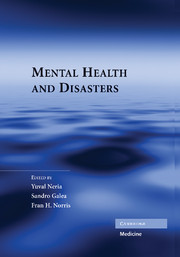Book contents
- Mental Health and Disasters
- Dedication
- Mental Health and Disasters
- Copyright page
- Contents
- Acknowledgments
- Contributors
- 1 Disaster Mental Health Research:
- Part One Concepts
- Part Two Psychopathology After Disasters
- Part Three Vulnerability And Resilience
- Part Four Special Groups
- Part Five Interventions And Health Services
- 19 Mental Health Treatments In The Wake Of Disaster
- 20 Evidence-Based Long-Term Treatment of Mental Health Consequences of Disasters among Adults
- 21 Mental Health Care for Children in the Wake of Disasters
- 22 Utilization of Mental Health Services after Disasters
- Part Six Case Studies
- Part Seven Questions and Directions
- Index
21 - Mental Health Care for Children in the Wake of Disasters
from Part Five - Interventions And Health Services
Published online by Cambridge University Press: 07 May 2010
- Mental Health and Disasters
- Dedication
- Mental Health and Disasters
- Copyright page
- Contents
- Acknowledgments
- Contributors
- 1 Disaster Mental Health Research:
- Part One Concepts
- Part Two Psychopathology After Disasters
- Part Three Vulnerability And Resilience
- Part Four Special Groups
- Part Five Interventions And Health Services
- 19 Mental Health Treatments In The Wake Of Disaster
- 20 Evidence-Based Long-Term Treatment of Mental Health Consequences of Disasters among Adults
- 21 Mental Health Care for Children in the Wake of Disasters
- 22 Utilization of Mental Health Services after Disasters
- Part Six Case Studies
- Part Seven Questions and Directions
- Index
Summary
Keywords
- Type
- Chapter
- Information
- Mental Health and Disasters , pp. 350 - 365Publisher: Cambridge University PressPrint publication year: 2009
- 1
- Cited by

